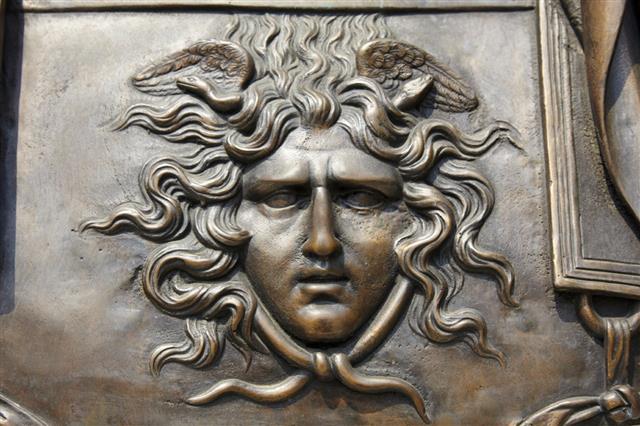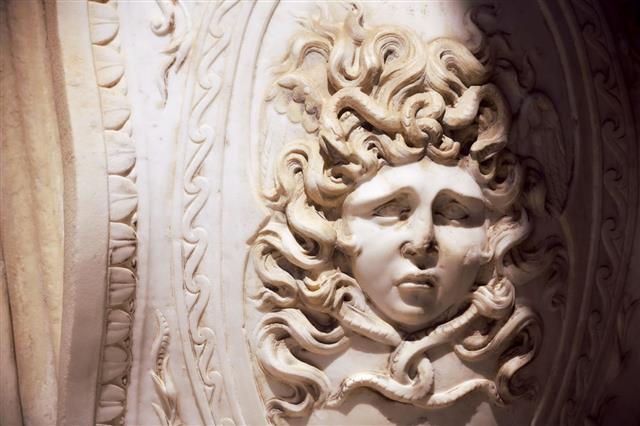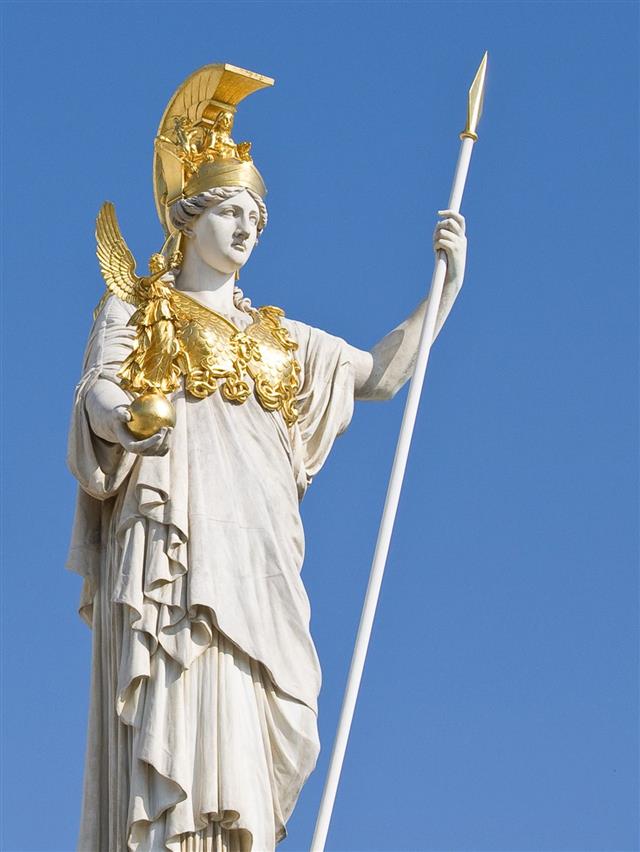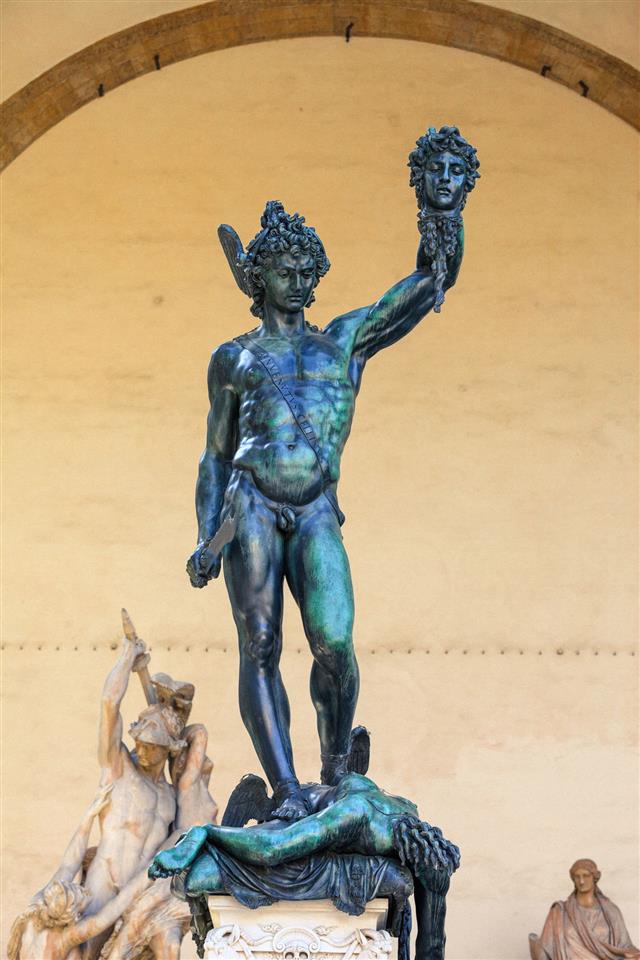
Throughout Greek mythology, Medusa has always remained a rather enigmatic and interesting figure in her own right. Perceived as a demon, her story actually ranks high up in the list of tragedies. But who was she and what was her fate? Find out everything in this article on the Grecian gorgon Medusa.
“Beyond all others she
was famed for beauty, and the envious hope
of many suitors. Words would fail to tell
the glory of her hair, most wonderful
of all her charms–A friend declared to me
he saw its lovely splendour.” ~ Ovid’s description of Medusa in Metamorphoses in book 4:1181-95, as translated by Thomas More
The tale of Medusa in Greek mythology can be called nothing more than a tragedy, in my opinion. If the feminists of today happen to come across her story, they shall feel violated themselves. They say that the fate of women have been etched by injustices hurled at them throughout the history of humanity. The tale of this maid, doomed to become a beast, is one more example to vouch for it. In soothe, the histoires of Perseus and Medusa in Greek mythology are intricately woven together. In order to understand her plight, one needs to know her original identity, the injustice incorporated in her situation and her downfall.
The Tale of Medusa
The parentage of Medusa is an oft debated topic in mythology even though she is most popularly believed to be the daughter of Ceto and her brother Phorcys, the primordial sea god and goddess among all Greek gods and goddesses, residing in the western ocean. Medusa also had two sisters named Stheno and Euryale.
Initially Medusa was an officiator of sacred rituals in the temple of Goddess Athena, the goddess of wisdom and war and the daughter of Zeus and Metis. It was the wrath of this shimmery grey-eyed goddess – always armed with a cuirass and a helmet and accompanied by an owl – that doomed Medusa, the fair-skinned damsel with breathtaking hair cascading down her length, into becoming a hideous, atrocious chthonic or subterranean gorgon (a term derived from the Greek gorgós literally meaning “dreadful”). However, there are primarily two versions of how this pitiful fate befell her.
Legend I
It was no secret that Medusa’s beauty was not earthly. She was divinely magnificent and mesmerized anybody who lay their eyes on her. As John Dryden put it,
Medusa once had charms; to gain her love
A rival crowd of envious lovers strove.
They, who have seen her, own, they ne’er did trace
More moving features in a sweeter face.
Yet above all, her length of hair, they own,
In golden ringlets wav’d, and graceful shone.
But being the priestess of the shrine of Athena, she could never experience the glorious warmth and beauty bestowed on earth by Helios, the Greek deity of the Sun in her northern sanctuary. So, she sought permission from the goddess to journey to the soothing southern regions of the earth, blessed with the sun’s visit everyday. But for some obscure reason Athena declined to grant her permission to travel to the summer-y, pleasant south. Gravely enraged at being refused, “fair-cheeked Medusa”, as depicted by the Ancient Greek lyric poet Pindar, dared to utter the sacrilegious words wherein she ascribed Athena’s jealousy of her beauty as the reason for not allowing her sojourn.
This angered the goddess beyond imagination and she transformed the beautiful Medusa into a monstrous gorgon wherein her enchanting locks were changed to a headful of venomous serpents. Her hands were altered to razor-sharp brass claws and she was given tusk-like fangs that were incisive.
This account of Medusa’s transformation into one of the bestial mythical creatures is not very shocking given that throughout mythology Greek deities have been known for their murderous tempers and hell raising every time someone managed to cross their paths. However, it is the next account which is more shocking and pitiful.
Legend II
Given that “she was a very lovely one”, as penned by Humphries, Poseidon, god of the seas was greatly appealed by her ravishing aura. The facts on Poseidon indicate that Athena and Poseidon were competing with each other quite often, and even sought to win over the honor of the Grecian populace once. Athena won that battle by giving the people an olive tree which proved to be more useful in comparison to Poseidon’s salt water lake. Ever since, the master of the seas tried to find ways to defile Athena.
Both these reasons seemed to be enough for Poseidon, the Roman Neptune, and he violated and deflowered Medusa in the altar of Athena itself,
And the goddess turned away, and hid her eyes
Behind her shield, describes Humphries.
Athena’s fury was infernal. She went insane with rage as her shrine was befouled by Poseidon. But her powers were inferior to those of the Sea god. So, she vented her spleen on the priestess of her sanctuary. Some say that she gave Medusa a rotund, tusked face along with eyes that turned all gazers to stone. Even her sisters transformed into similar gorgons. Stheno became a gorgon, as she stood by Medusa when Athena bedamned her sister, and happened to assume the most ferocious avatar as she slew the maximum number of men, more than the number of victims that her two sisters murdered put together. Euryale became a gorgon with a body covered in dragon-like scales. But unlike her siblings, Medusa was mortal. She was even conceiving Poseidon’s offspring in her womb when the goddess showered her wrath upon her.
So, this is how her fate was sealed for a crime that she was a victim of. From being sought after by numerous suitors, she became one of the most fear-inspiring and despised beasts ever exhibited by the Greek culture.
After that Medusa resided in the Isle of Cisthene, to the east of Ethiopia and in the Red Sea, in a rocky cavern at the end of the living world and the inception of the world of the dead. Her sisters stayed with her. Her cave was nigh the springs of the Oceanus river, from which sprouted nine streams that encircled the entire globe.
Death of the Gorgon
From this juncture the fate of the Grecian warrior Perseus get entwined with that of the gorgon’s which spells her doom.
The Coming of Perseus
It all started on the fateful day when Dictys, the brother of King Polydectes, saved Danaë – the daughter of King Acrisius of Argos and Eurydice – and her child, Perseus. King Polydectes, the monarch of the isle of Seriphos, was smitten by the beauty of the lady and wanted to have her instantaneously. But the only bone of contention that came in the way of his much desired matrimony was Danaë’s young son, Perseus. Overtly protective of her mother and ardent to save her from the clutches of Polydectes, Perseus was adamant to let the monarch have his way.
Very cunning, the king too knew that he could get rid of the young hindrance by some devious means alone. So, he shrewdly declared that he was about to adopt Princess Hippodamia as a wife and would be very pleased if his subjects showered exorbitant presents on him as tokens of love and good wishes. But Perseus did not have sufficient monetary resources to get the king anything at all. As part of the ploy, the king summoned him into the royal court and flouted the young man and egged his courtiers on to do the same. His ego hurt, Perseus declared that he would wrest anything that Polydectes wished to have, no matter how difficult and at this point the king grabbed the opportunity and asked the boy to fetch the head of the deadly gorgon, Medusa.
Confused and yet too proud to say a no, Perseus set out on his quest to obtain the unobtainable. On reaching the shrine of Athena he pleaded for help from the goddess throughout the night. Only too happy to help anybody on a voyage to destroy Medusa, Athena presented him with a shield as sheeny as a mirror, which would enable the warrior to keep from looking at the gorgon’s lethal gaze, and slay her just by looking at her reflection on the mirror-like surface. Moreover, she asked him to visit the fountain of the nymphs who would bestow him with triple presents to aid in the accomplishment of the mission. Finally, Hermes, the messenger Greek god or the herald of the other gods, gave him his winged soles to help Perseus fly to the end of the world. The nymphs gifted Perseus with a diamond-tipped steel to permeate successfully into the pelt of the gorgon, Hades’ cap to render him invisible and finally a sack to carry the fatal head of Medusa.
Finally, he had to visit the sisters Graeae – Deino, Enyo and Pemphredo – who shared an eye that saw all and a tooth. They had the same parents as the gorgon sisters. These “grey witches” were bewildered when approached by Perseus donning Hades’ cap and they couldn’t see him. Thinking that the tallest of them would be able to spot their visitor, the other two passed their eye to the tall witch, but Perseus grabbed hold of it and imperilled to hurl it into the ocean if they failed to direct him to the gorgon. At a loss, the sisters told them where to find Medusa and Perseus dropped the eye on the dusty ground and flew away.
On reaching the den of Medusa, he found all the three sisters sleeping peacefully. Avoiding looking directly at her and only envisioning her through the shield reflection, he hacked off Medusa’s head with the hard, diamond clad sword and then stuffed it into the sack. He used his soles to get away. On waking up, Stheno and Euryale chased him, while the latter also bawled and cried loudly. It is believed that since Medusa was also pregnant at the time of her death, from her dripping blood drops rose Chrysaor, the giant who was born with an aor or golden blade in his hand, and Pegasus, the winged white equine who according to the legend of Pegasus took flight to Mount Helicon where he resided among the muses. He was christened after “pegae” which were the nine springs the formed the river Oceanus, near which he was born. Chrysaor in certain versions is portrayed as a young fellow while in others as a boar with wings.
The Final Destination…
It is said that after marrying Andromeda on the way back and turning the titan Atlas, with the sky on his back, into rock while flying past him, Perseus went back to the manor of Polydectes. There he was greatly grieved and enraged at the same time to see Danaë enslaved and treated as a menial servant in the castle. He spirted into the court of the king. Polydectes was dumbstruck to see the warrior alive and then refused to believe that he had accomplished the killing of the deadly gorgon all by himself. At this Perseus said nothing and simply revealed the gorgon head in front of the king and his ministers. All of them turned to stone instantaneously, such was the potency of even the dead Medusa and the rest, as they say, is history.
According to Ovid, Perseus, who seconded Athena’s punishment as just, handed the head over to the deity Athena who wore it on the Aegis Pallas, her shield, forevermore…
It is believed that post-death, Medusa’s soul roamed the caverns of the Underworld and was one of the spirits not to have fled, besides Meleager, when the Grecian hero, Hercules visited Hades during his 12 labours. Hercules even tried to slay her with his steel, but Hermes enlightened him that she had already been reduced to a mere apparition.
So, this is the lore of one of the most hideous Greek mythical creatures, Medusa. Punished for being a victim and then slain for the purpose of gifting. A woman transformed into a commodity and used as a mere piece of armament. Greek mythology would be incomplete without her story as she is the epitome of immortal power. As portrayed in the words of Jane Ellen Harrison more appropriately, “her potency only begins when her head is severed, and that potency resides in the head…”






